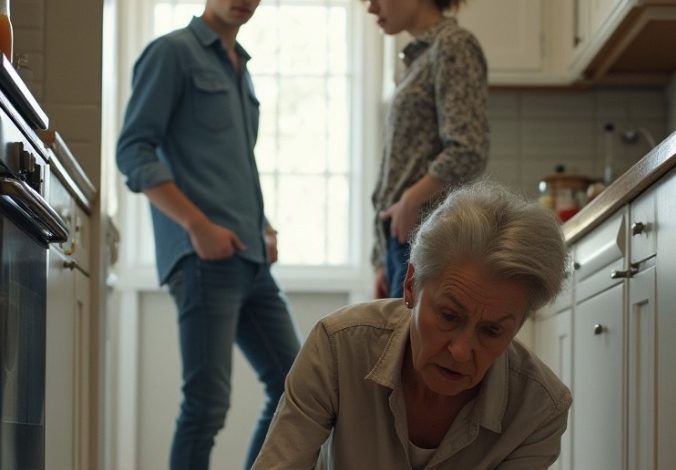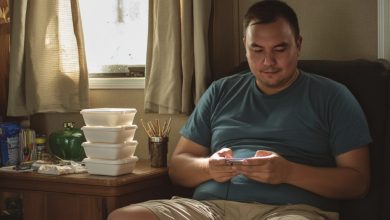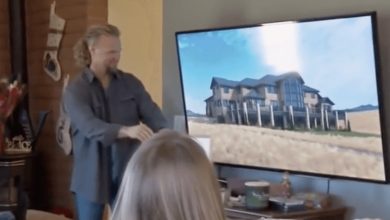They Threw Me Out with Two Hundred Dollars and No Respect They Never Expected the Secret My Late Husband Left in My Name

I was standing at the stove, slowly stirring the soup as it simmered, when Dawn’s voice suddenly cut through the kitchen like a knife.
“You are completely useless! I don’t know how someone your age still doesn’t know how to cook properly!”
My daughter-in-law’s words struck harder than the heat rising from the pot. Before I could react or even turn around, she grabbed the ladle from beside me and smacked the side of my head. The metal was hot—boiling—and the moment it hit my temple, a wave of pain shot through my skull.
I gasped and staggered slightly, reaching for the counter to steady myself. But from the living room, I heard nothing except the sound of the television getting louder. Robert—my only child—was sitting on the couch, choosing to drown out the argument, or maybe pretending he didn’t hear.
That silence hurt more than the burn on my skin.
Five minutes later, the crash came. I had been trying to lift a pot, my hands still shaking, my head still throbbing. The handle slipped, the pot tipped over, and suddenly everything was falling. Plates shattered. Cups bounced off the tiles. Soup splattered across the floor. My legs slipped, and I went down with everything else.
That was the sound Robert finally reacted to.
He came running. When he reached the doorway of the kitchen, he froze. His face went pale when he saw me lying on the floor in the middle of broken dishes and spilled vegetables.
“Mom… what did you do?” he whispered, as if he couldn’t believe the mess, as if I had caused all of it on purpose.
But he didn’t help me up. He didn’t touch me.
Dawn appeared a moment later, her face twisted with anger.
“She’s losing her mind! Robert, your mother is completely unstable! Look what she did! You can’t let her stay here anymore. You need to choose—her or me.”
That sentence echoed inside me. Robert looked at her, then at me, then back at the floor. The silence stretched until my heart felt like it was tearing apart.
“I’m sorry, Mom,” he finally said quietly. “But I think it’s better if you… find another place. You’re causing problems, and Dawn and I need peace in our home.”
With those words, everything ended.
But what neither of them knew—not in that kitchen, not in that moment—was that I still had one final card hidden. Something that would change their world more than they ever imagined.
My name is Helen. I am seventy-one years old. I have hands shaped by decades of work—kneading dough, washing clothes, preparing meals. My life was built around caring for others. Caring for my husband. Caring for my son. I thought loyalty was rewarded. I thought kindness came back to you eventually.
I was wrong.
Six months ago, I buried my husband Henry. We spent fifty beautiful, complicated, imperfect years together. Then one spring afternoon, while watering his beloved geraniums in the backyard, his heart simply stopped. I found him on his knees in the garden he loved so much.
Since that day, I lived in silence. Our house felt too big. The photos on the walls felt like they were watching me. I was drowning in memories.
Robert insisted I move in with him and Dawn.
“It’s safer, Mom. You shouldn’t be alone at your age,” he told me on the phone.
I wanted to believe he was doing it out of love. I needed to believe that. So I packed my entire life into four suitcases, closed the door of the house Henry and I built, and stepped into a future I hoped would be kind.
Robert’s house was beautiful—modern, polished, expensive. But the warmth I imagined was missing. Dawn welcomed me with a tight smile, saying my name like a stranger greeting another stranger.
Not “Mom.”
Not even “Mother-in-law.”
Just “Helen.”
That first day, I felt something shift inside me. A soft warning. But I ignored it. I wanted to fit in. I wanted to belong.
I moved into their guest room, a small space at the end of a narrow hallway. I hung Henry’s pictures above the bed. I folded my simple dresses carefully into the wardrobe. I told myself that I would make this work. I had to.
From that day forward, my role in the house became painfully clear: I was there to serve.
Every morning, I woke before sunrise. I brewed coffee, cooked breakfast, swept the floors, washed dishes. Robert thanked me without looking up from his phone. Dawn never thanked me at all. She pointed out mistakes, criticized the smallest things—too much salt, not enough sugar, crumbs on the counter.
Everything I did was wrong in her eyes.
And Robert said nothing.
Days turned into weeks. Weeks blurred into months. I became a ghost in their home—silent, tired, careful not to upset Dawn, careful not to take up too much space, careful not to remind them I existed.
But all of this built up inside me like pressure in a sealed jar.
And on the afternoon Dawn hit me, the jar cracked.
First came the sting of the ladle.
Then the shame.
Then the crash.
When Robert chose Dawn over me, it felt like the final blow.
But I didn’t argue. I didn’t beg. I didn’t fight.
That night, I packed my things quietly. At dawn, Robert handed me two hundred dollars like he was giving money to a stranger. A taxi took me to a cheap motel. For the first time in decades, I slept somewhere that did not feel safe.
Days passed. Then a week. Then another.
When the money ran out, I was forced to leave the room. I walked streets until my legs hurt. I sat on park benches. I learned which restaurants threw out food late at night. I lined up at church soup kitchens. I slept on metal benches when I had no other option.
I sent messages to Robert.
Robert, I need help.
Robert, I don’t have money for food.
Robert, where are you?
All of them were marked as “seen.”
None were answered.
One afternoon, while digging through one of my suitcases, I found an envelope with Henry’s handwriting.
I hadn’t seen it before. I didn’t even remember packing it.
Inside was a letter that changed everything.
Henry had been investing for years. Silently. Carefully. Secretly. He had purchased properties, stocks, bonds. He had bought buildings when no one wanted them. They grew in value. Then grew more.
All of them were in my name.
Thirteen properties.
And one of them—the one that made my breath stop—was Robert and Dawn’s building. Magnolia Street, Number 452.
They had no idea they were living in my building. They had no idea Henry had set them up with discounted rent years ago. They thought they were doing me a favor by letting me live with them.
I owned everything.
In the envelope, Henry wrote:
“If someone ever hurts you… use these. They are yours. I built all of this for you. Not for Robert. Not for anyone else. For you.”
There were deeds. Bank accounts. Investments. More money than I could imagine.
Ten million dollars in total.
And I had been searching for food in dumpsters.
I contacted Henry’s lawyer. He confirmed everything.
I checked into a luxury hotel. I cleaned myself up. I ate warm meals again. My hands stopped shaking.
Then came the moment I had been waiting for.
I raised the rent on all my properties—including Robert’s apartment. Their special rate expired with Henry’s death. Rent went from $400 to $2,500.
Dawn panicked.
Robert panicked.
Late payments piled up.
Then the eviction notices were sent.
Robert begged to speak to the building owner.
He never expected it to be me.
When he entered the lawyer’s office and saw me sitting there—clean, elegant, strong—his face fell apart.
“Mom…?”
I raised a hand.
“No. Today, I am not your mother. Today, I am the owner of Mendoza Enterprises. And you are a tenant who has not paid rent in two months.”
He broke down. He cried. He apologized. He begged.
He said Dawn had left.
He had lost his job.
His debts were crushing him.
He said he was sorry.
But sorry was not enough.
“Robert,” I told him gently, “I lost everything because you wanted to keep your wife happy. You chose silence. And silence destroyed us.”
He cried harder. I let him.
Then I stood.
“You have two days to leave the apartment.”
I walked out, leaving him in tears.
Months passed.
I moved into one of my small houses. I painted the walls. I planted roses. I volunteered at the shelter that once helped me. I rebuilt myself piece by piece.
Then one morning, the phone rang.
“Mom… it’s me. Robert.”
His voice was calm, different.
“I just wanted to tell you… I’m trying. I’m working nights, paying off my debts, going to therapy. I’m not calling to ask for anything. I just wanted you to know that I’m learning.”
He hesitated.
“And maybe one day… if you ever feel ready… maybe we could share a cup of coffee.”
I looked at my blooming roses. I breathed in deeply.
“Maybe,” I said softly.
And when I hung up, I felt something I hadn’t felt in years:
Peace.
Because I, Helen Salazar, seventy-one years old, survivor of pain, of betrayal, of homelessness, of silence…
had finally reclaimed my life.










